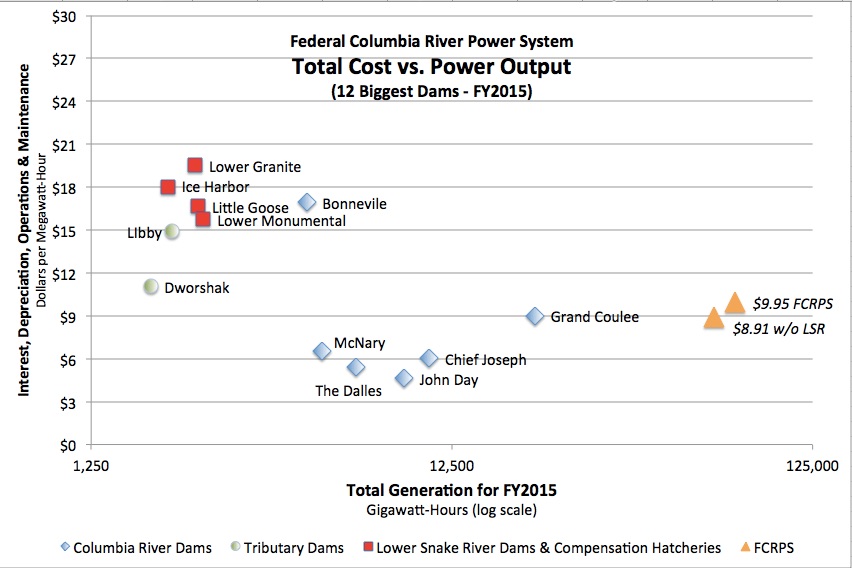forum
library
tutorial
contact

Simpson Should Start With
This 'What If' Question
by Marty Trillhaase
Lewiston Tribune, May 5, 2019
|
the film forum library tutorial contact |

|
Simpson Should Start With
by Marty Trillhaase
|
 Congressman Mike Simpson is looking with fresh eyes at the four dams on the lower Snake River.
Congressman Mike Simpson is looking with fresh eyes at the four dams on the lower Snake River.
He's asking "what if" questions about what the future may look like without those dams.
That's no commitment toward breaching, but it is a pledge toward reversing the decline of salmon runs along that river.
"I've come to the conclusion that I'm going to stay alive long enough to see salmon returned in healthy populations in Idaho," he told an audience attending the "Energy, Salmon, Agriculture, and Community: Can We Come Together?" conference at the Andrus Center last week.
Even as a veteran of the House and a senior member of the Appropriations Committee, Simpson remains one of 535 representatives and senators; he can't get far on his own.
He can't count on getting much help from Congressman Russ Fulcher, R-Idaho, who told the Tribune's Eric Barker " ... economic indicators and constituent feedback have strongly indicated that dam breaching would not be a viable option for stakeholders in the 1st. District. ..."
Neither will Congresswoman Cathy McMorris Rodgers, R-Wash., come to Simpson's aid. She "vehemently" disagrees with anyone who wants the dams removed.
Simpson's fellow Idaho Republican, Sen. Jim Risch, wants the dams retained; Sen. Mike Crapo is more flexible in calling for all sides to meet at the table.
There is one exception, however.
Simpson does not need their help to get this question answered: Do the four dams on the lower Snake River deliver a return on the investment taxpayers made into their construction and ongoing maintenance? Is it worth it to continue to update the dams and locks as well as dredge the channels in order to serve a shrinking amount of shipping?
Or are America's taxpayers getting fleeced?
If the dams offer a value to the people who paid for their construction and maintenance, then future discussions will revolve around weighing competing values.
If it turns out the costs outweigh the benefits, however, then the debate is no longer limited to those who are pro-fish and those who are pro-dam. Now it's a matter of who is pro-taxpayer.
That's a far cry from the question Washington Gov. Jay Inlsee's $750,000 study will explore: If the dams are removed to help supply starving Puget Sound orca with more abundant salmon, what kind of help will the people left behind require?
It's also decidedly not what a federal court-ordered environmental impact statement is exploring: whether it's necessary to remove one or more dams to save the fish.
Besides, the sponsors of those studies --Inslee and the federal agencies preparing the EIS, including the Army Corps of Engineers -- are hardly neutral observers.
To explore this question, you need an unquestionably objective, credible source.
On his own, he can assign the Congressional Research Service, a branch of the Library of Congress, to look into it.
Six years ago, Simpson took such a step. An Idaho legislative task force was exploring whether to sue the federal government into relinquishing its lands to the state. At Simpson's request, a CRS review established just managing the holdings of three federal agencies within Idaho -- the U.S. Forest Service, the Bureau of Land Management, and the U.S. Fish and Wildlife Service -- would set the state back about $400 million.
And that didn't count what the federal government spent extinguishing forest fires.
If they didn't know it before, Idahoans realized they couldn't afford taking over the federal lands without breaking the state budget, raising taxes or selling off the choicest parcels to the highest bidders. The study virtually stopped the land transfer movement in its tracks.
But CRS typically analyzes information that's already been gathered. If Simpson wants to unearth new facts, he can turn to the gold standard -- the Government Accountability Office. This is the investigative arm of Congress. It typically roots out government waste, fraud and abuse, but also performs audits and reviews policies.
Getting GAO into the picture is not as easy. The agency sifts through various proposals and prioritizes.
But in this case, Simpson's call would get returned. GAO pays attention to requests from committee and subcommittee chairmen and chairwomen -- as well as the ranking members of those panels.
Simpson is the former chairman and the current ranking minority member of the House Appropriations Subcommittee on Energy and Water Development. That panel has jurisdiction over the Bonneville Power Administration, the Army Corps of Engineers and the Bureau of Reclamation.
If Simpson intends to ask a series of "what if" questions about the dams, why not start here?
learn more on topics covered in the film
see the video
read the script
learn the songs
discussion forum
